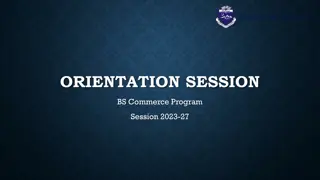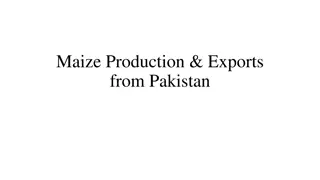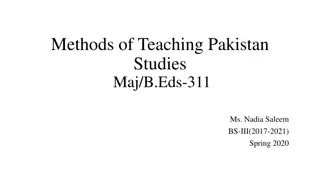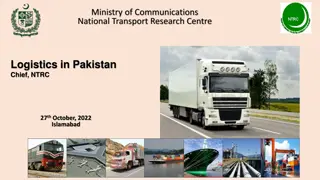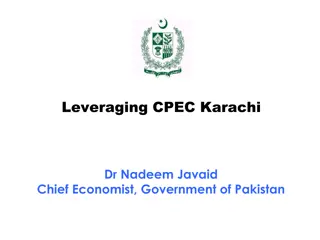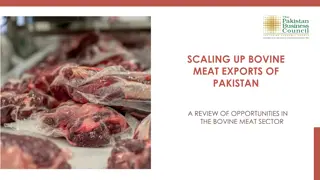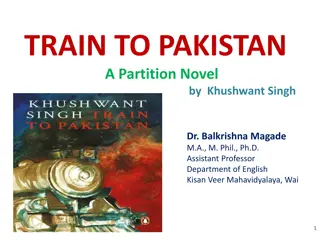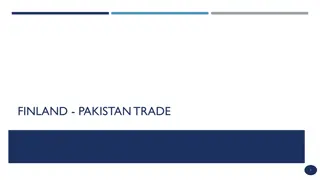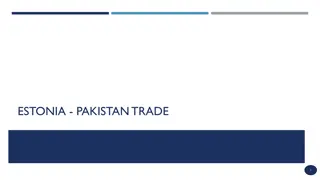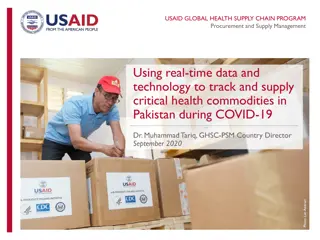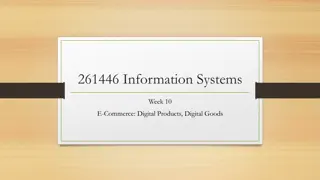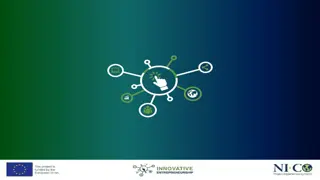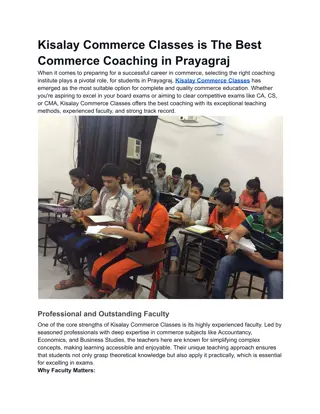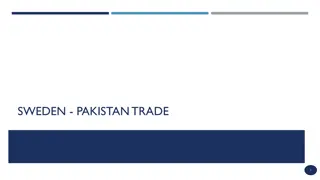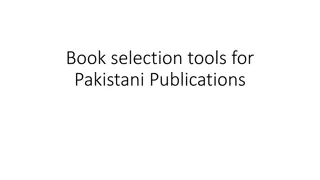Draft E-Commerce Policy Framework of Pakistan Presentation
The draft E-Commerce Policy Framework of Pakistan, presented by the Ministry of Commerce & Textile Commerce Division, defines e-commerce as the buying and selling of goods or services, including digital products, through electronic transactions conducted via the internet or other computer-mediated networks. The presentation highlights the growth of e-commerce in Pakistan, key objectives of the policy framework, evolution process, and key areas covered by the framework.
Download Presentation

Please find below an Image/Link to download the presentation.
The content on the website is provided AS IS for your information and personal use only. It may not be sold, licensed, or shared on other websites without obtaining consent from the author. Download presentation by click this link. If you encounter any issues during the download, it is possible that the publisher has removed the file from their server.
E N D
Presentation Transcript
Draft e-Commerce Policy Framework of Pakistan Presentation by Ministry of Commerce & Textile Commerce Division
Definition of e-Commerce For the purpose of e-Commerce Policy Framework; e-Commerce is defined as buying and selling of goods or services including digital products, through electronic transactions conducted via the internet or other computer- mediated (online communication) networks.
e-Commerce in Pakistan* e-Commerce sales in 2017 = Rs. 20.7 billion Grew by 93.7% in 2018 = Rs. 40.1 billion 60% e-Commerce transactions by value are post-paid cash-on- delivery (CoD) transactions *SBP s Annual Report on the State of Economy 2017-18
Objectives of e-Commerce Policy Framework Key driver of Pakistan s economy Single window hub and National e-Commerce Council for review and implementation of Policy Facilitation through regulatory framework Enhancing exports through e-Commerce platforms Youth empowerment and employment opportunities through digital connectivity Efficient payment infrastructure Streamlining legal systems, taxation structures and digital infrastructure e-Commerce ecosystem, responsive to consumers interests, including dispute resolution Transparency and accountability in digital industry Implementation of Sustainable Development Goal-8 (Growth & Decent Work), Goal-9 (Infrastructure and Innovation) and Goal-12 (Sustainable Consumption and Production)
Evolution of e-Commerce Policy Framework Public and private sector was consulted through Policy Unit and Advisory Council 50 consultative sessions held 300 stakeholders consulted 5 working group reports from public and private sector Draft publicized on Commerce Division website
e-Commerce Policy Framework Key Areas SME & Youth Consumer Protection ICT & Telecom Data Financial Inclusion & Digitization Facilitation & Regulation Protection and Investment Global Connectivity Logistics Taxation
e-Commerce regulation and facilitation I - Key Features: a. Facilitation Establishment of National e-Commerce Council Re-export of faulty goods Implementation of National Single Window Review and following of International best practices in taxation Allocation of the subject of e-Commerce to the Commerce Division Introduction of e-Procurement model
e-Commerce regulation and facilitation b. Regulation Compulsory registration with SECP of all e-businesses, having sales of more than 1 million PKR per annum All online businesses to maintain a physical address in Pakistan Code of Conduct introduced for e-Commerce platforms to ensure consumer protection
Financial inclusion and digitization through payment infrastructure development II - Key Features: a. Facilitation Guidelines for merchants digital on boarding ,by SBP Access to international payment gateways b. Regulation Mechanism introduced for gradual shifting on digital payments c. Promotion Regulation of free lancers by MoC (Pak at 4th no in the world in free lancing services) Retention of export earnings in foreign currency accounts
Empowering Youth and SMEs through Business Support Programs and Trade Development III - Key Features: a. Facilitation Association of Freelances, being registered with MoC Creation of an e-Commerce business facilitation hub, by TDAP Exports enhancing e-Commerce trainings & talent development programs for SMEs Digital marketing for SMEs Synergies with other Government initiatives, like Kamyab Jawan program b. Promotion Initiation of Pak e-SME program E-Commerce aggregator Access to finance for SMEs through venture capital and seed funding
CONSUMER PROTECTION IV - Key Features: a. Regulation Amendments in existing Federal & Provincial Consumer Protection Laws to address e-disputes as well Mandatory setting up of customer support system and dispute resolution mechanism by all e-commerce platforms Establishment of Consumer Courts in all districts of each province b. Facilitation Establishment of Independent Alternate dispute resolution mechanism at Federal & Provincial level Inclusion of e-commerce disputes in draft Trade Dispute Resolution Act (TDRA) Creation of e-Courts for quick processing of consumer cases
Taxation V - Key Features: a. Facilitation Harmonization of GST collection system at provincial level, to avoid double taxation Introduction of a simplified, one paged sales tax return form b. Promotion Encouragement and promotion of e-businesses through reduced GST on services ,by the Provincial Revenue Authorities
ICT Infrastructure and Telecom Services in Pakistan VI - Key Features: Total tele-density of ICT sector=76.56%. (PTA s data of 2017-18) 161million cellular subscribers, 70million 3G/4G subscribers and 72 million broadband subscribers (PTA s data of 2019) a. Facilitation Collaboration of MoC & MoITT to further strengthen Pak s ICT infrastructure and Telecom sector Expedited work on complimentary policies such as accession to Information Technology Agreement, WTO.
Logistics VII - Key Features: a. Facilitation Introduction of Express Mail Service (EMS Plus) by Pakpost for speedy export processing to Saudi Arabia, U.A.E., Japan, U.K., Thailand and Australia. Automation in Logistics, to be adopted by e-Commerce platforms Mechanism for timely payments to e-Commerce sellers Logistics Infrastructure identification, to complement e-businesses b. Regulation National Logistics Policy by Ministry of Communications, to develop a chapter on e-Commerce facilitation
Data Protection and Investment VIII - Key Features: a. Regulation Pakistan s first Cloud Policy, being developed by MoITT Early enactment of Data Protection Act. b. Facilitation Encouragement of investment in complete chain of e-Commerce including logistics, payment gateways and market places
Global Connectivity and Participation in Multilateral Negotiations IX - Key Features: a. Regulation Continuous engagement at Multilateral forums Negotiations b. Facilitation Access to foreign markets c. Promotion Transformation of TDAP into a digitally savvy and service oriented organization with capabilities for digital marketing and e- Commerce promotion
Action Matrix S# Policy Initiative Key Areas Lead Ministry/Dept Facilitating Actors E-Commerce regulation and facilitation 1. Regulation & Facilitation MoC, SECP, MoITT FBR, Consumer Protection Councils, PPRA Financial through development inclusion payment and digitization infrastructure 2. Regulation, Facilitation, & Promotion SBP SBP MoITT / SMEDA / SBP Empowering Youth and SMEs through Business Support Programs and Trade Development 3. Promotion & Facilitation MoC, TDAP,SMEDA, Microfinance Banks MoITT MoC Councils, e-Commerce Platforms FBR,PRAs ,Consumer Protection Consumer Protection 4. Regulation & Facilitation Ministry of Law & Justice, Taxation 5. Promotion & Facilitation PRAs ICT Infrastructure and Telecom Services in Pakistan 6. Promotion & Facilitation MoC, MoITT USF, Ignite Logistics 7. Regulation & Facilitation Pakpost, MoComm. e-Commerce Platforms Data Protection and Investment 8. Regulation & Facilitation MoITT, MoC Global Connectivity and Participation in Multilateral Negotiations 9. Regulation, Facilitation, & Promotion Pak Trade Missions, Associations & Chambers MoC
Additions in the New draft Foreword has been included for ownership of the document at the highest level. Policy Framework s goals have been aligned with the SDGs, for better implementation of the Policy Framework in line with Digital Pakistan Policy. Only one definition of e-Commerce has been incorporated to any avoid ambiguity.
Additions in the New draft (proposals) Establishment implementation of the Policy Framework. The companies having sales of more than one million PKR per annum, to be register with SECP. The purpose is to facilitate small businesses & startups. The subject of e-Commerce, to be allocated to Commerce Division under the Rules of Business, 1973, for its better coordination and facilitation. e-Procurement model, to be adopted by public and private sector,to encourage and promote digitization of procurement procedures in Pakistan. of e-Commerce Council ,to supervise
Additions in the New draft Gradual shift of Cash-on-Delivery (CoD) payment method to digital payments, with a time line of Sept, 2022 for payments beyond 10,000/= PKR. Furthermore, efforts shall be made to convert all CoD payments into digital payments preferably within 10 years (2029). It is recommended that M/oIT&T in collaboration with SBP will approach PayPal and other payment gateways to ensure availability of several international payment gateways in Pakistan
Additions in the New draft A dedicated chapter on Empowering Youth and SMEs through business support programs and recognition of free lancers as an important segment for enhancing exports has been further developed. Four special initiatives, as mentioned below, have been introduced in this regard Creation of an e-Commerce business facilitation hub. Empower youth and SMEs for e-Commerce, through Pak e-SME program. Access to finance for SMEs to promote digitization in Pakistan. Skill development Program.
Additions in the New draft Establishment of e-Courts has been proposed Data Protection, Localization and Sovereignty will be covered in Cloud Policy and Data protection Act being drafted by M/o IT&T A new chapter on global connectivity and participation in multilateral negotiations has been added A proposal has been incorporated regarding transformation of the Trade Development Authority of Pakistan into a digitally savvy and service oriented organization
Additions in the New draft A dedicated chapter on ICT infrastructure and Telecom services in Pakistan has been included wherein it has been proposed that, Commerce and IT Ministries will continue expedited work on complementary policies such as accession to Information Technology Agreement of WTO. In consultation with the M/o Communications it has been proposed that Ministry of Communications shall include a dedicated chapter on facilitating e-Commerce, including timely payments to sellers by the logistics companies, in its draft National Freight and Logistics Policy.



